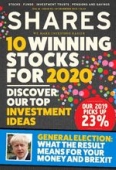Archived article
Please note that tax, investment, pension and ISA rules can change and the information and any views contained in this article may now be inaccurate.
All change: an unusual period for FTSE 100 CEOs

More than a fifth (22) of FTSE 100 companies have either changed their chief executive this year or announced plans to do so next year.
So what’s causing this turmoil at the top? ‘The FTSE 100 has not really gone anywhere for two years excluding dividends so individual CEOs have been under more pressure from investors,’ says Patrick Thomas, an investment director at Canaccord Genuity Wealth Management.
‘This has attracted the attention of activist investors particularly from the US who have been turning the screw. Changing the management is usually part of the package in their strategy for turning a company around.’
Despite the lack of growth from the UK’s benchmark index, Thomas rejects the notion that the number of CEO exits is reflective of a wider economic malaise.
He points out there are plenty of ‘non-bad reasons’ why a CEO has left a company, such as retirement or being a short-term appointment to execute a turnaround strategy.
In addition, it’s not worth investors getting too hung up on the identity of the person in the hot seat.
Often the success or failure of a business isn’t hugely reliant on a particular individual.

For example, a major pressure on banking profits is the downward trend in global interest rates, but there’s nothing much the permanent successor to John Flint at HSBC (HSBA) will be able to do about that.

Looking at the list of FTSE 100 bosses to have left their posts this year, Canaccord Genuity Wealth Management senior equity analyst Simon McGarry says there have been examples of companies in need of a shake-up – specifically Aviva (AV.), British American Tobacco (BATS), Imperial Brands (IMB) and Land Securities (LAND).
But he adds that CEO exits from others like Unilever (ULVR), Ferguson (FERG), Phoenix (PHNX) and BHP (BHP) were orderly departures and simply down to long-term succession planning.

Then there is Smith & Nephew (SN.), whose boss decided to step down after a row over pay. McGarry says that very large pay packages are now increasingly hard to justify.
While there are a number of reasons why a boss might quit a company, historically there has been a spike in CEO exits before recessionary years, the idea being that they bail out before things get messy.

‘There may be instances where the executive feels now is a good time to go, to ensure their legacy looks like a good one,’ says Russ Mould, investment director at AJ Bell.
The acceleration of boardroom changes has been viewed by investors as a sign of pessimism about the future. Conversely, if the rate of exits began to slow, the economic picture would undoubtedly look a lot brighter again.
Important information:
These articles are provided by Shares magazine which is published by AJ Bell Media, a part of AJ Bell. Shares is not written by AJ Bell.
Shares is provided for your general information and use and is not a personal recommendation to invest. It is not intended to be relied upon by you in making or not making any investment decisions. The investments referred to in these articles will not be suitable for all investors. If in doubt please seek appropriate independent financial advice.
Investors acting on the information in these articles do so at their own risk and AJ Bell Media and its staff do not accept liability for losses suffered by investors as a result of their investment decisions.
Issue contents
Editor's View
Feature
- Top performing funds of 2019
- What were the key themes for small caps in 2019?
- Big companies with big decisions to make in 2020
- All change: an unusual period for FTSE 100 CEOs
- Tracking the performance of the biggest emerging markets
- Emerging markets: Views from the experts
- Is inflation really dead and what can investors do if it isn't?
Great Ideas
- Share pick for 2020: IG Design
- Share pick for 2020: Lloyds Banking
- Share pick for 2020: Redrow
- Our 2019 picks have smashed the market with a 23% return
- Share pick for 2020: Luceco
- Four great funds to buy for 2020
- Share pick for 2020: Kainos
- Share pick for 2020: Begbies Traynor
- Share pick for 2020: Hotel Chocolat
- Share pick for 2020: Centrica
- Shares pick 2020: Wizz Air
- Share pick for 2020: Schroders
 magazine
magazine








